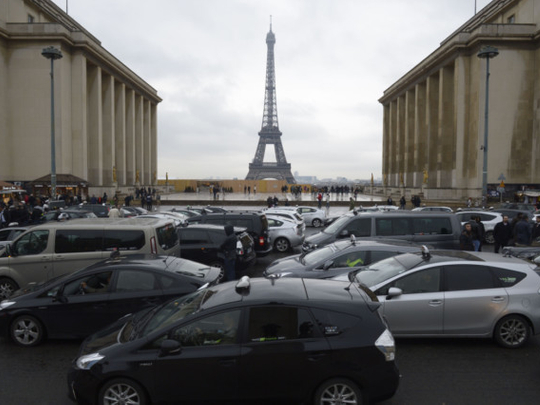
Paris: When mayor Anne Hidalgo detailed plans to ban vehicles from the centre of Paris by 2020, she framed the measures as a public health imperative in a country that has grown increasingly worried about the quality of its air.
But if passed by the City Council after debate in February, the proposal could also bring about what few other big cities have been able to accomplish: keeping a large portion of vehicles out of parts of the city centre.
The measures would be among the most far-reaching in Europe for reeling in the harmful particulates from diesel fuel and high-emission vehicles that burden its cities — and would go far towards curtailing the use of cars in Paris’ glittering centre, where heavy traffic is often the price paid to view the elegant Palais Garnier opera house, cruise the Champs-Élysées or merely get to work.
Yet even as the proposals were praised by public health officials, they raised questions about whether Hidalgo is catering to the interests of elite city dwellers who dislike traffic over the needs of lower-income Parisians — people who live on the edges of the city and whose cars probably would not pass stricter environmental controls.
“The language chosen by the mayor of Paris to talk about her anti-pollution plans has the air of being more of a war against automobile owners rather than an ecological battle for the capital,” wrote Le Figaro, a right-leaning newspaper.
Daniel QuEro, President of 40 millions d’automobilistes, a group representing car owners that claims more than 320,000 members throughout France, questioned Hidalgo’s socialist credentials.
“What is the barman who lives on the far outskirts of Paris supposed to do when he needs to get to his work late at night?” he asked. “Hidalgo’s proposal is that of a Champagne socialist who is far removed from concerns of everyday people.”
The reaction to the proposals, made public earlier this month in the Journal du Dimanche, is another indication of how difficult it is to keep cars out of the world’s big cities, even as pressure grows to reduce the use of fossil fuels and their climate-changing carbon emissions, and relieve the air pollution that is a growing health menace.
Though Paris, famed for its beauty, may seem quite different from pollution-choked Mumbai or Beijing, it shares their concerns about the health risks posed by particles released by burning diesel fuel, which have been linked to a range of health disorders including lung disease and heart attacks.
The city has already had its share of alarming pollution peaks including one last March, when pollution was so severe that the city offered free rides on subways and buses for three days to help clear the air amid public health concerns, particularly for the elderly, pregnant women, young children and those with respiratory ailments.
The World Health Organisation has said that diesel exhaust causes lung cancer, and some experts say it is more carcinogenic than secondhand smoke. A 2005 European Commission study cited by City Hall said an estimated 40,000 people in France die prematurely from fine particle air pollution each year.
France has one of the highest concentrations of diesel cars in Europe, where they have been popular because of their high fuel efficiency. According to the European Automobile Manufacturers Association, 53.3 per cent of new car registrations in Western Europe last year involved diesel power.
In the US — where diesel costs more than gasoline and has not been widely available, and where diesel cars are more expensive — the greater air-quality concern has been coal-burning power plants. According to the AAA, nine million passenger vehicles run on diesel fuel in the US, about 3.5 per cent of the overall fleet of 255 million.
Under the Paris proposal, only vehicles with low-particulate emissions would be allowed on some of the capital’s main boulevards, while large areas in the city centre would be off-limits to vehicles other than local residents’ cars, taxis, buses, emergency or delivery vehicles; trucks and tourist buses would be restricted in some areas.
“I want diesel cars out of Paris by 2020,” Hidalgo said, although later her aides said the proposal targets any vehicles with high particle emissions or other high-polluting exhaust.
In London, the office of Mayor Boris Johnson said it planned to introduce a low emission zone in the city centre, to take effect in 2020, where high-polluting diesel vehicles — and other environmentally unfriendly vans and motorbikes — would be charged £12.50 (about Dh71) a day. However, environmental campaigners have been pressing for an outright ban on diesel cars, and they say Paris could provide a spur.
Wendy Mead, Chairwoman of the Environment Committee on the City of London Corp., the local authority supervising the city’s financial district, called the proposed Paris diesel ban “an encouraging move”.
Christophe Najdovski, Paris’ deputy mayor in-charge of transport and a member of the Green Party, said the health threat posed by air pollution affected all Parisians, and he rejected criticism that the measures were elitist. The city, he said, recently voted to slash the price of monthly transit passes for zones outside the city as an incentive for those living outside the centre to leave their cars at home. The rapid transit system, however, does not operate 24 hours a day.
According to a poll this month by Ifop, a leading polling institute, 54 per cent of residents in the greater Paris area support banning diesel cars in the capital.
During a peak last December, the air pollution in Paris was so dense that breathing its air was akin to inhaling secondhand smoke in a 20-square-metre room in which eight smokers were puffing cigarettes, Najdovski said, citing a study conducted by the National Center for Scientific Research and Air quality monitoring network, an organisation that monitors air quality in Paris.
“We don’t want to have pollution like a city in China — we are Paris,” he said.
The latest plans are part of a continuing effort by local authorities to make Paris more pedestrian friendly by reducing the number of cars. Already, electric cars and recharging stations pepper the city.
The city’s popular Vélib’ bicycle rental programme, through which residents can rent a sturdy bicycle from hundreds of public stations, is popular and a forerunner to bike-sharing programs in New York and other cities.
Benoit Hartmann, a spokesman for France Nature Environnement, an environmental defence group that supports Hidalgo’s plan, noted that such transportation alternatives were available for everyone. “This isn’t an elitist measure reserved for the rich,” he said.
Nevertheless, opponents of the diesel car ban say it smacks of hypocrisy given that, until recently, policymakers in France and across Europe were extolling diesel cars as cleaner and more fuel efficient compared with gas-guzzling vehicles, emitting less carbon dioxide per kilometre. The promotion of diesel fuel has been especially notable in France, where it is less expensive than unleaded gas.
Stephen Joseph, Chief Executive of the Campaign for Better Transport in London, an environmental group, said that governments across Europe had helped create a generation of hazardous cars and were now being forced into an urgent about-face. “The science on the effects of air pollution on health, and, in particular, the hazards posed by diesel cars, is hardening up,” he said.
— Los Angeles Times/Washington Post












